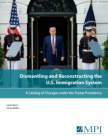Visa Policy
Recent Activity
Recent Activity
Los países de América Latina y el Caribe han aprovechado, de manera pragmática, una variedad de herramientas políticas para otorgar estatus legal a al menos la mitad de los más de 6 millones de venezolanos desplazados en la región. Este informe explora hasta qué punto los venezolanos desplazados han podido obtener un estatus legal en los 15 principales países receptores, su acceso al mercado laboral y a servicios públicos, y dónde persisten brechas.
Los países de América Latina y el Caribe están siendo transformados por crisis políticas y económicas, nuevos acuerdos de libre circulación y otras tendencias. La cantidad de inmigrantes que viven en la región casi se ha duplicado desde 2010, un cambio increíble en un corto período de tiempo. Este artículo da sentido a una profunda transición en curso en el hemisferio occidental.

















USCIS Budget Implosion Owes to Far More than the Pandemic